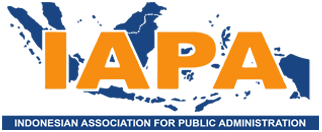Indonesian Government Policy Innovation Encouraging Democracy of Media Development
DOI:
https://doi.org/10.61332/antasena.v2i2.218Keywords:
Policy Analysis, Government, Media DevelopmentAbstract
The research aims to find innovations in the analysis of Indonesian government policies to encourage democratization of media development that is under government control. The analysis of the writing emphasizes the perspective of citizens' rights to media which refers to Article 19, Universal Declaration of Human Rights (UDHR). The research method uses descriptive analysis with qualitative methodology, explaining breakthroughs in policy analysis and the role of government in encouraging media development through primary and secondary data in contributing to the complexity of media issues in empowering civil society through macro and micro level policies. The research population is around 600 media with a sample of around 60 mass media, online media, radio, and television. Research results: there is a rapid liberalization of the media industry, but not all media can survive. Because the sustainability and diversity of the media are determined by economic, political and government regime interests. Research on innovation in government policy roles must be encouraged to follow the development of the rapidly growing digitalization of media platforms compared to the birth of regulations for free and responsible media freedom and educating and educating the nation
References
Algazo, F. A., Ibrahim, S., & Yusoff, W. S. (2021). Digital Governance Emergence and Importance. Journal of Information System and Technology Management, 6(24), 18–26. https://doi.org/10.35631/jistm.624003
Anggoman, E. (2019). Penegakan hukum pidana bagi pelaku kekerasan/pelecehan seksual terhadap perempuan. Sustainability (Switzerland), 11(1), 1–14. http://scioteca.caf.com/bitstream/handle/123456789/1091/RED2017-Eng-8ene.pdf?sequence=12&isAllowed=y%0Ahttp://dx.doi.org/10.1016/j.regsciurbeco.2008.06.005%0Ahttps://www.researchgate.net/publication/305320484_SISTEM_PEMBETUNGAN_TERPUSAT_STRATEGI_MELESTARI
Celis, K., Knops, L., Van Ingelgom, V., & Verhaegen, S. (2021). Resentment and coping with the democratic dilemma. Politics and Governance, 9(3), 237–247. https://doi.org/10.17645/pag.v9i3.4026
Chuard, P., Garard, J., Schulz, K., Kumarasinghe, N., Rolnick, D., & Matthews, D. (2022). A portrait of the different configurations between digitally-enabled innovations and climate governance. Earth System Governance, 13(July), 100147. https://doi.org/10.1016/j.esg.2022.100147
Clark, N., & Albris, K. (2020). In the interest(S) of many: Governing data in crises. Politics and Governance, 8(4), 421–431. https://doi.org/10.17645/pag.v8i4.3110
Daulay, L. S., Mardianto, M., & Nasution, M. I. P. (2023). Literasi sehat untuk menjaga kesehatan mental anak di era digital. Jurnal Raudhah, 11(1), 25–37. https://doi.org/10.30829/raudhah.v11i1.2767
Digital, P. (2024). Implementasi keputusan menteri pan-rb nomor 11 tahun 2024 dan penggunaan platform digital online untuk meningkatkan kinerja pada sdm protokol kementerian perindustrian.
Daulay, L. S., Mardianto, M., & Nasution, M. I. P. (2023). Literasi sehat untuk menjaga kesehatan mental anak di era digital. Jurnal Raudhah, 11(1), 25–37. https://doi.org/10.30829/raudhah.v11i1.2767
Digital, P. (2024). Implementasi keputusan menteri pan-rb nomor 11 tahun 2024 dan penggunaan platform digital online untuk meningkatkan kinerja pada sdm protokol kementerian perindustrian.
Effing, R. (2024). Will the metaverse be out of control? Addressing the ethical and governance implications of a developing virtual society. Digital Government: Research and Practice, 5(3). https://doi.org/10.1145/3674148
Erkut, B. (2020). From digital government to digital governance: Are we there yet? Sustainability (Switzerland), 12(3), 1–13. https://doi.org/10.3390/su12030860
Hesami, S., Jenkins, H., & Jenkins, G. P. (2024). Digital Transformation of Tax Administration and Compliance: A Systematic Literature Review on E-Invoicing and Prefilled Returns. Digital Government: Research and Practice, 5(3). https://doi.org/10.1145/3643687
Ho, C. W. L., & Caals, K. (2021). A Call for an Ethics and Governance Action Plan to Harness the Power of Artificial Intelligence and Digitalization in Nephrology. Seminars in Nephrology, 41(3), 282–293. https://doi.org/10.1016/j.semnephrol.2021.05.009
Holland, C., McCarthy, A., Ferri, P., & Shapira, P. (2024). Innovation intermediaries at the convergence of digital technologies, sustainability, and governance: A case study of AI-enabled engineering biology. Technovation, 129(September 2022), 102875. https://doi.org/10.1016/j.technovation.2023.102875
Holzer, M., & Kim, S.-T. (2020). Digital governance in municipalities worldwide: A Longitudinal Assessment of Municipal Websites Throughout the World. E-Governance Institute, National Center for Public Productivity, 106.
Kloppenburg, S., Gupta, A., Kruk, S. R. L., Makris, S., Bergsvik, R., Korenhof, P., Solman, H., & Toonen, H. M. (2022). Scrutinizing environmental governance in a digital age: New ways of seeing, participating, and intervening. One Earth, 5(3), 232–241. https://doi.org/10.1016/j.oneear.2022.02.004
Kondori, N. F., & Rouhani, S. (2021). Presenting a Conceptual Framework for Digital Judicial Transformation for Digital Governance. Journal of Public Administration, 13(3), 593–620. https://doi.org/10.22059/JIPA.2021.317608.2891
Kornyshova, E., Boutal, L., & Benramdane, M. K. (2023). Digital Business Ecosystems: Organizational Model, Roles, and Governance Towards Flexibility. Procedia Computer Science, 225, 4621–4630. https://doi.org/10.1016/j.procs.2023.10.460
Kruk, S. R. L., Kloppenburg, S., Toonen, H. M., & Bush, S. R. (2021). Digitalizing environmental governance for smallholder participation in food systems. Earth System Governance, 10(October), 100125. https://doi.org/10.1016/j.esg.2021.100125
Marc Holzer, Aroon Manoharan, G. V. R. (2021). Global cities on the web: an empirical typology of municipal websites. International Public Management Review, 11(3), 104–121. http://citeseerx.ist.psu.edu/viewdoc/summary?doi=10.1.1.453.3622
Misuraca, G., & Viscusi, G. (2014). Digital governance in the Public Sector: Challenging the policy-maker’s innovation dilemma. ACM International Conference Proceeding Series, 2014-Janua, 146–154. https://doi.org/10.1145/2691195.2691286
Noor, Z. Z. (2020). Metodologi penelitian kualitatif dan kuantitatif (p. 113).
Downloads
Published
How to Cite
Issue
Section
License
Copyright (c) 2024 Taufiqurokhman Taufiqurokhman, Endang Sulastri, Asep Setiawan, Maya Puspita Dewi, Lilik Sumarni

This work is licensed under a Creative Commons Attribution-ShareAlike 4.0 International License.















